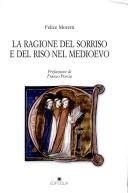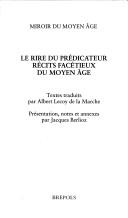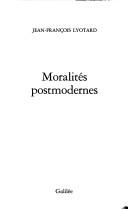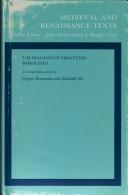| Listing 1 - 10 of 16 | << page >> |
Sort by
|
Book
ISBN: 2377472222 237747019X Year: 2021 Publisher: Grenoble : UGA Éditions,
Abstract | Keywords | Export | Availability | Bookmark
 Loading...
Loading...Choose an application
- Reference Manager
- EndNote
- RefWorks (Direct export to RefWorks)
La littérature médiévale allemande comprend de nombreux trésors encore inconnus du public français. Le Pauvre Henri est le seul texte composé par Hartmann von Aue, poète souabe de la fin du xiie siècle, qui ne soit pas une adaptation d’un texte français. Ce récit bref, très proche de l’exemplum, relate la punition qui s’abat sur un jeune chevalier oublieux de Dieu. Devenu lépreux, le héros tente de trouver un remède à sa maladie et apprend par un médecin de Salerne qu’il ne peut être sauvé que par le sang d’une vierge qui accepte de se sacrifier pour lui. Quelques années plus tard, la fille du métayer qui l’a recueilli consent au sacrifice suprême et part avec le Pauvre Henri en direction de Salerne a n de sauver son seigneur. Cette œuvre originale, reposant sur d’anciennes légendes comme celle de saint Sylvestre, est à la croisée des croyances populaires et de la clergie de l’auteur. Elle est également le témoin de la variance des textes médiévaux : tandis que la version A demeure sans doute assez proche du texte aujourd’hui perdu de Hartmann, la version B nous offre une histoire différente dans laquelle la fille du métayer gagne en liberté et en autonomie. Pour la première fois, cette édition propose une traduction française accompagnée des versions A et B en mettant en relief leurs divergences, ainsi qu’une interprétation qui rend compte de l’arrière-plan théologique de l’œuvre. En annexe se trouvent des textes complémentaires traitant la même thématique, notamment la légende de saint Sylvestre d’après la Kaiserchronik (Chronique impériale).
History --- Medieval & Renaissance Studies --- Literature German Dutch Scandinavian --- maladie --- théologie --- sacrifice --- amour --- rédemption --- littérature allemande médiévale --- exemplum --- sang humain --- croyances populaires --- lèpre --- moyen haut allemand
Book
ISBN: 1282296159 9786612296154 3110217953 9783110217957 9783110217940 3110217945 Year: 2009 Publisher: Berlin New York Walter de Gruyter
Abstract | Keywords | Export | Availability | Bookmark
 Loading...
Loading...Choose an application
- Reference Manager
- EndNote
- RefWorks (Direct export to RefWorks)
Sprichwörter und Exempla sind zwei literarische Gattungen, die sich während des gesamten Mittelalters parallel entwickelten. Zwischen ihnen kam es häufig zu Wechselwirkungen, denn sie waren an den gleichen Diskursen beteiligt: Aufgrund ihrer großen Beliebtheit breiteten sich beide Formen in beinahe allen Bereichen der mittelalterlichen Kultur aus. So griff man in der Rechtsprechung, der Philosophie, der Theologie, der Geschichtsschreibung und in der didaktischen wie fiktiven Literatur auf Sprichwörter und Exempla als Hilfsmittel zur Argumentation zurück. Dieser Facettenreichtum rechtfertigt den interdisziplinären Ansatz dieses Bandes. Das Freiburger Colloquium 2007 hat zu diesem Zweck Mittellateiner, Romanisten, Germanisten und Historiker vereint, um diese Entwicklung aus verschiedenen Gesichtspunkten zu untersuchen. Herausgearbeitet werden die beiden Traditionsstränge sowohl in der lateinischen Literatur als auch in der volkssprachigen der romanischen und germanischen Sprachen, die in ihrem Ganzen die geistige Einheit des mittelalterlichen Europas offenbaren.
Exempla --- Latin literature, Medieval and modern --- Literature, Medieval --- Proverbs, German --- Proverbs, Romance --- History and criticism --- Aphorism. --- Exemplum. --- Proverb. --- Saying. --- Words of Wisdom.
Book
ISBN: 2852039435 9782852039438 Year: 1998 Volume: 47 Publisher: Paris: Champion,
Abstract | Keywords | Export | Availability | Bookmark
 Loading...
Loading...Choose an application
- Reference Manager
- EndNote
- RefWorks (Direct export to RefWorks)
Book history --- Fiction --- anno 500-1499 --- Exempels --- Exempla --- Exemplum --- Literature, Medieval --- Religious literature --- Littérature médiévale --- Littérature religieuse --- History and criticism --- Histoire et critique --- Littérature médiévale --- Littérature religieuse --- Index

ISBN: 8872283124 Year: 2001 Volume: 5. Publisher: Bari Edipuglia
Abstract | Keywords | Export | Availability | Bookmark
 Loading...
Loading...Choose an application
- Reference Manager
- EndNote
- RefWorks (Direct export to RefWorks)
Exempels --- Exempla --- Exemplum --- Civilization, Medieval --- Laughter --- Joking --- Comic, The --- Civilisation médiévale --- Rire --- Plaisanterie --- Comique --- History --- History and criticism --- Histoire --- Histoire et critique --- Civilisation médiévale --- Religious aspects --- Catholic Church --- Comic [The ] --- Christianity
Book
ISBN: 9780814274637 0814274633 0814274625 0814213235 9780814274620 9780814213230 0814253857 Year: 2017 Volume: *1 Publisher: Columbus, Ohio The Ohio State University Press
Abstract | Keywords | Export | Availability | Bookmark
 Loading...
Loading...Choose an application
- Reference Manager
- EndNote
- RefWorks (Direct export to RefWorks)
In this book, Jennifer Garrison examines literary representations of the central symbol of later medieval religious culture: the Eucharist. In contrast to scholarship that depicts mainstream believers as enthusiastically and simplistically embracing the Eucharist, Challenging Communion: The Eucharist and Middle English Literature identifies a pervasive Middle English literary tradition that rejects simplistic notions of eucharistic promise. Through new readings of texts such as Piers Plowman, A Revelation of Love, The Book of Margery Kempe, and John Lydgate's religious poetry, Garrison shows how writers of Middle English often take advantage of the ways in which eucharistic theology itself contests the boundaries between the material and the spiritual, and how these writers challenge the eucharistic idea of union between Christ and the community of believers.
Lord’s Supper in literature. --- English literature --- History and criticism. --- Lord's Supper in literature. --- Christian dogmatics --- Thematology --- Old English literature --- anno 1200-1499 --- anno 1100-1199 --- Literature --- Allegory --- Body of Christ --- Eucharist --- Exemplum --- God --- Jesus --- Laity
Book
ISBN: 2503360408 9782503360409 Year: 1982 Volume: 40 Publisher: Turnhout: Brepols,
Abstract | Keywords | Export | Availability | Bookmark
 Loading...
Loading...Choose an application
- Reference Manager
- EndNote
- RefWorks (Direct export to RefWorks)
Christian church history --- History as a science --- anno 500-1499 --- Exempla --- Moyen âge, --- Sources --- --Exemplum --- --Exempla --- Preaching --- Sermons, Medieval --- History --- History and criticism --- 873.3 --- 82 "04/14" --- -Academic collection --- #RBIB:XTOF --- 251 --- Christian preaching --- Homiletics --- Speaking --- Pastoral theology --- Public speaking --- Anecdotes --- Didactic literature --- Homiletical illustrations --- Example --- Middeleeuws Latijnse literatuur --- Literatuur. Algemene literatuurwetenschap--Middeleeuwen --- -Religion Preaching --- Religious aspects --- 82 "04/14" Literatuur. Algemene literatuurwetenschap--Middeleeuwen --- 873.3 Middeleeuws Latijnse literatuur --- Academic collection --- Religion Preaching --- Medieval sermons --- Moyen âge, 476-1492 --- Exemplum --- Exempla - Bibliography --- Preaching - History - Middle Ages, 600-1500 - Bibliography --- Sermons, Medieval - History and criticism - Bibliography

ISBN: 2503502431 9782503502434 Year: 1992 Publisher: Paris: Brepols,
Abstract | Keywords | Export | Availability | Bookmark
 Loading...
Loading...Choose an application
- Reference Manager
- EndNote
- RefWorks (Direct export to RefWorks)
244*1 --- 244*1 Religieuze humor --- Religieuze humor --- Fiction --- Old French literature --- Contes --- Sermons --- Anecdotes --- Humour français --- Civilisation médiévale --- Illustrations --- Conte --- --France --- --Sermon --- --Prédication --- --Illustration --- --Anecdote --- --Humour --- --Moyen âge, --- Tales --- France --- Contes - France --- Sermons - Illustrations --- Anecdotes - France --- Sermon --- Prédication --- Illustration --- Anecdote --- Humour --- Moyen âge, 476-1492 --- LITTERATURE LATINE MEDIEVALE --- EXEMPLUM
Book
ISBN: 9782503542201 2503542204 Year: 2011 Publisher: Turnhout: Brepols,
Abstract | Keywords | Export | Availability | Bookmark
 Loading...
Loading...Choose an application
- Reference Manager
- EndNote
- RefWorks (Direct export to RefWorks)
Œuvre d'édification chrétienne, en 781 chapitres ou historiettes, qui est à la fois commentaire de l'Écriture sainte, manuel d'instruction chrétienne et recueil d'"exempla" sous la forme d'un pèlerinage spirituel qui va de la Création au bonheur éternel. - Composée entre 1313 et 1330. À l'origine, comportait une image par histoire. - 21 ms recensés : BN, Paris (10) ; Bibl. royale, Bruxelles (3) ; Musée Condé, Chantilly (2) ; Bibl. de l'Arsenal, Paris ; Bibl. Ste Geneviève, Paris ; Bibl. mun., Reims ; Bibl. mun., Caen ; Bodl. Libr., Oxford ; Brit. Libr., Londres
091.31:7.04 --- 091 <44 CHANTILLY> --- Verluchte handschriften: iconografie --- Handschriftenkunde. Handschriftencatalogi--Frankrijk--CHANTILLY --- 091 <44 CHANTILLY> Handschriftenkunde. Handschriftencatalogi--Frankrijk--CHANTILLY --- 091.31:7.04 Verluchte handschriften: iconografie --- Littérature chrétienne française --- Ci nous dit --- --Exemplum --- --Littérature de dévotion --- --XIVe s., --- Musée de Condé --- --Manuscrit médiéval --- --Ci nous dit --- Littérature chrétienne française --- --Iconographie --- --091.31:7.04 --- Manuscripts, Medieval --- Illumination of books and manuscripts --- Christian literature, French --- Manuscrits médiévaux --- Enluminure --- History and criticism --- Histoire et critique --- France --- Church history --- Sources --- Histoire religieuse --- Musée Condé (Chantilly, Oise) --- Manuscripts --- Catalogs --- Illumination of books and manuscripts [Medieval ] --- Exempla --- Early works to 1800 --- Sources. --- --Manuscripts, Medieval --- Enluminure médiévale --- Iconographie --- Exemplum --- Littérature de dévotion --- XIVe s., 1301-1400 --- Manuscrit médiéval --- Chantilly, musée condé, ms 26-27

ISBN: 2718604301 9782718604305 Year: 1993 Publisher: Paris: Galilée,
Abstract | Keywords | Export | Availability | Bookmark
 Loading...
Loading...Choose an application
- Reference Manager
- EndNote
- RefWorks (Direct export to RefWorks)
Philosophy and psychology of culture --- General ethics --- Literature and morals --- Postmodernism (Literature) --- Literature --- Littérature et morale --- Postmodernisme (Littérature) --- Littérature --- Aesthetics --- Esthétique --- Exemplum --- --Genre littéraire --- --Moralité --- Ethics, Modern --- Postmodernism --- 3375 --- -Postmodernism --- Post-modernism --- Postmodernism (Philosophy) --- Arts, Modern --- Avant-garde (Aesthetics) --- Modernism (Art) --- Philosophy, Modern --- Post-postmodernism --- Modern ethics --- Postmodernism. --- Littérature et morale --- Postmodernisme (Littérature) --- Littérature --- Esthétique --- --Ethics, Modern --- Genre littéraire --- Moralité --- Ethics, Modern - 20th century

ISBN: 9004085157 900462323X Year: 1988 Volume: vol 4 Publisher: Leiden New York Köln Brill
Abstract | Keywords | Export | Availability | Bookmark
 Loading...
Loading...Choose an application
- Reference Manager
- EndNote
- RefWorks (Direct export to RefWorks)
English literature --- Exempels --- Exempla --- Exemplum --- Homiletical illustrations --- Illustraties voor de prediking --- Illustrations pour la predication --- Dialogues, Latin (Medieval and modern) --- -Exempla --- Fables, Latin (Medieval and modern) --- -Christian literature, Latin (Medieval and modern) --- Latin fables, Medieval and modern --- Anecdotes --- Didactic literature --- Example --- Latin dialogues, Medieval and modern --- Latin literature, Medieval and modern --- Latin Christian literature, Medieval and modern --- Translations into English --- Dialogue moral des creatures --- Christian literature, Latin (Medieval and modern) --- Translations into English.
| Listing 1 - 10 of 16 | << page >> |
Sort by
|

 Search
Search Feedback
Feedback About UniCat
About UniCat  Help
Help News
News